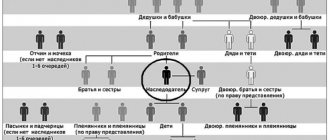1
A will is a written expression of the will of a citizen, in which he leaves instructions about his property in the event of death. The document is subject to notarization. It can be issued by any citizen over the age of 18 , endowed with full legal capacity. However, during his lifetime, the testator has the right to rewrite the document as many times as he likes. Until the death of the owner, the text is not valid. Let's look at when a will comes into effect after death.
What property can be bequeathed?
A person has the right to bequeath any property: jewelry, housing, money, cars, etc. In this case, the heirs receive property rights and obligations: for example, they will have to pay a mortgage loan if the testator purchased the inherited property with a mortgage that he did not have time to repay.
Often in wills you can find the wording “all property that turns out to belong to me.” It prevents the testator from drawing up a new document each time during his lifetime if the composition of the property changes - say, he bought another apartment.
The same object of ownership (for example, housing) can be transferred to several heirs, and the testator can determine the shares of each of them in the document. If none are specified, the heirs receive equal shares of the property.
Who can receive property under a will?
A Russian has the right to bequeath his property to any persons: friends, relatives, other citizens of the Russian Federation, foreigners, legal entities, and the state. He also has the right to disinherit his legal heirs without explanation. But if the testator has children under 18 years of age, disabled children (spouse, dependents or parents), they will be able to receive a share in the inheritance, even if they are not specified in the will.
In addition, a “spare” heir can be written into the will - he will be able to claim the inheritance if one of the “main” heirs dies or refuses to accept the inheritance.
According to the new law, which will come into force on September 1, the testator can order in his will the creation of an inheritance fund, which will act as one of the heirs along with the persons or legal heirs specified in the document.
If the will does not indicate the obligatory heirs, their full circle will be established after the opening of the inheritance and the recalculation of the shares by the notary.
To whom will the property be transferred if its owner did not leave a will?
There are two types of inheritance: by will and by law. The first involves the transfer of property according to the will of the deceased owner. If a person has not made a will during his lifetime, inheritance occurs according to law. At the same time, there is a sequence of inheritance of property by relatives. A total of eight inheritance queues are defined.
First priority heirs include the spouses, parents and children (or grandchildren if the children are deceased) of the testator. If there are no such heirs, the property is divided between the second-order heirs - these are the testator's sisters and brothers with whom he shares one or both parents, as well as nieces and nephews. Third-degree heirs include aunts, uncles, and cousins and brothers of the testator. The heirs of the fourth to sixth lines are more distant relatives of the deceased: great-grandparents, great-great-grandchildren and great-grandsons, great-aunts and grandfathers, great-aunts and grandsons, great-aunts and uncles, first-cousin nephews and nieces. If there are no heirs listed above, the heirs of the seventh order can claim the property of the deceased - these are the stepdaughters, stepsons, stepmother and stepfather of the testator. The state is the heir of the eighth stage. The property becomes his property if there are no other heirs.
Where does the discovery take place?
It is worth paying attention to one more point. We found out when the will comes into force. Where does the opening of a testamentary document take place?
There are various options for the development of events. Here are the options found in real life:
- The opening of the envelope with the inheritance document takes place at the place of residence of the deceased. This is the most common case.
- The discovery takes place where a person supposedly lived and died. This option is extremely rare. Therefore, they simply do not pay attention to it.
- The document is opened in the place where most of the property being inherited is located.
As a rule, most often the procedure is carried out according to the last registration of the testator, in the same office in which the will was drawn up.
What is a legacy fund?
This is a legal entity whose main functions are the management of the testator’s property: business, money and other assets. The fund is created only if the deceased expressed such a desire (this is indicated in the will), and only after the death of the person. Thanks to the fund, it is possible to preserve the property of the testator and dispose of it in accordance with the expressed will of the person.
That is, all the bequeathed property of the testator after his death is retained in the foundation. The charter and conditions for managing the fund are prescribed in the will: the size, procedure, methods and terms for the formation of property, the procedure for disposing of existing property and income, and the persons who have the right to manage them. Part of the property accumulated in the fund or from the income from this property can be given to a circle of persons specified in the will - relatives of the deceased, citizens who are not heirs, or organizations.
First of all, the possibility of opening such a fund is relevant for wealthy citizens, business owners who have many assets. But there is no property qualification. For example, if a person has several apartments that he rents out or resells, receiving income from this, he can establish a fund that will continue this activity after his death, and the proceeds will be transferred to the persons specified in the will.
Cost of registering a will for an apartment
In accordance with the rules of law, a citizen independently writes the text of a will. But sometimes a person, without special knowledge about the rules for drawing up this document, doubts his abilities, fearing to miss the nuances. Therefore, some people decide to seek the help of a lawyer to draw up a will for an apartment, and would like to know in advance how much it costs.
If the text of the document is written independently, you will only have to pay a notarization fee. As established by the Tax Code, it is 100 rubles (clause 13, part 1, article 333.24 of the Tax Code of the Russian Federation dated 05.08.2000 No. 117-FZ).
The price of the service for writing a will for an apartment is not specified in the law, since this is not a notarial service. However, usually the cost of this procedure does not exceed 1000 rubles. Read more about how much it costs to draw up a will with a notary.
In what cases can you do without a notary?
After drawing up a will, the notary checks its text, prints the document on a special form, and then certifies it. There are also closed wills, the contents of which the notary does not see - he only receives a sealed envelope in front of two witnesses. In some situations, when drawing up a will, you can do without notarization - if a person does not have the opportunity to contact a notary, or if special circumstances arise that pose a threat to his life. Then the will is drawn up in writing and signed by the testator in the presence of two witnesses.
You can enter into inheritance after 6 months
To accept an inheritance, six months are allotted from the date of the death of the testator or his declaration of death. To enter into inheritance rights, you must contact a notary with an application to open an inheritance case. This is done in the area where the testator was registered and where his death certificate was received.
If at the time of the testator’s death the heir lived with him in the same apartment and was registered there, he has the right to open an inheritance case at any time. In fact, it is considered that he accepted the inheritance, and he does not fall within the 6-month period.
Day of supposed death
Sometimes it happens that a person is declared dead, but the day of his actual death is unknown. The court may specify a specific date for the person's death. If the day of death coincides with the day of the expected death, then the will comes into force from the moment specified in the court ruling.
However, in this case you will have to deal with some peculiarities. What is it about? The countdown of the six months allotted for accepting the inheritance will begin from the moment the person is declared dead, and not from the date of his expected death. Fortunately, this option almost never occurs in practice.
Unified information system of notaries
The will may be kept by the testator or by a notary. After the will is certified, information about it is entered into the electronic register of the Unified Notary Information System, which also contains data in the event of replacement or cancellation of the document. The system is open to all notaries in Russia. Thus, if the heirs do not know the place of storage of the will drawn up by a relative, in any notary office in the country they can be provided with information about the notary who certified the document.
It is imperative to find a will, since it may happen that the heirs of the first priority will inherit according to the law, and if other heirs later appear who have a will, all transactions with the inherited property will be contested.
Types of will
The legislation defines three types of wills:
- Open, notarized.
- Closed.
- Committed under extraordinary circumstances.
Open
A standard will is drawn up personally by the testator or, from his words, written down by a notary. In the latter case, the authorized person is obliged to transfer the document to the will-maker for reading and signature. However, if the author of the will is unable, for health reasons or other reasons, to independently read and certify his instructions, other persons can do this for him:
- The notary will read out loud what is written from the words of the testator and leave a corresponding note on the paper.
- A specially invited, disinterested witness will sign the will, and the notary will make a note about the reason for this and write down the personal, passport and contact information of the citizen involved.
Then the notary certifies the deed in two copies with his seal and signature. After this, the will is considered executed. One sample remains in the custody of the notary, and the second is transferred to the author.
But an act of unilateral will of a citizen can be drawn up without the participation of a notary. Under certain circumstances, the following have the authority to certify orders for the posthumous transfer of legal relations:
- chief or duty doctors of medical institutions;
- doctors and directors of homes for the disabled or elderly;
- captains of ships sailing under the flags of the Russian Federation;
- expedition leaders;
- commanders of military units;
- heads of prisons and correctional colonies.
The document certified by them is transferred within a reasonable time to the notary office at the place of residence of the testator, if the authorized person has information about this, or to any other notary - this is not important for storing the will.
Closed
A closed act strictly limits access to its contents. The testator draws it up, as a rule, in order to maintain complete secrecy - the orders indicated in it are hidden even from the notary. Access to them is opened only after the death of the author, within 15 days from the date of presentation of the supporting certificate, in the presence of interested persons and at least two witnesses.
The testator achieves complete confidentiality through the following actions:
- Seals the paper with his own written and signed last will into an envelope.
- Invites two witnesses and, in their presence, delivers the will to the authorized person.
The notary is responsible for further carrying out the procedure. In the presence of the testator and witnesses, he places the closed document in another envelope and seals it. Then he notes on it information about the originator, place and date of adoption, full names and addresses of witnesses.
In emergency situations
A will written under emergency circumstances is not equivalent in legal force to the options presented above. In order to achieve its recognition, the heirs will have to prove in court the fact of the free will of the testator and the presence of truly extraordinary circumstances when it occurred.
In this case, interested parties should pay attention to the criteria for the validity of such a document:
- The orders were stated and signed personally by the testator.
- Its composition can be confirmed by at least two witnesses.
- The author died within a month of writing the will.
What documents do heirs need to inherit?
When contacting a notary, the heir must take with him documents: the original or duplicate of the death certificate, a certificate of persons who lived with the testator at the time of his death, documentary evidence of family ties (marriage or birth certificate). If the chain of documents confirming family relationships is long, it is necessary to show everything - with marriage and birth certificates of all relatives who are between the heir and the testator.







